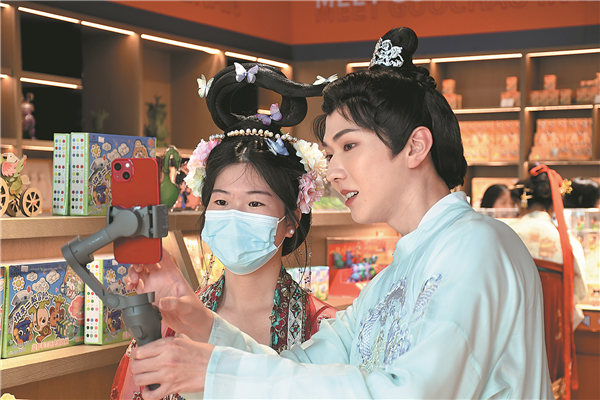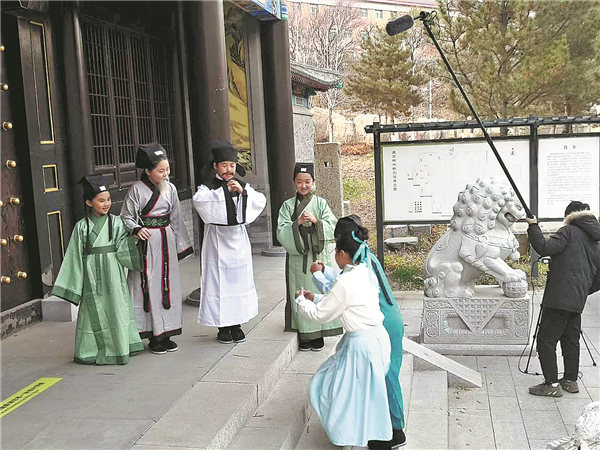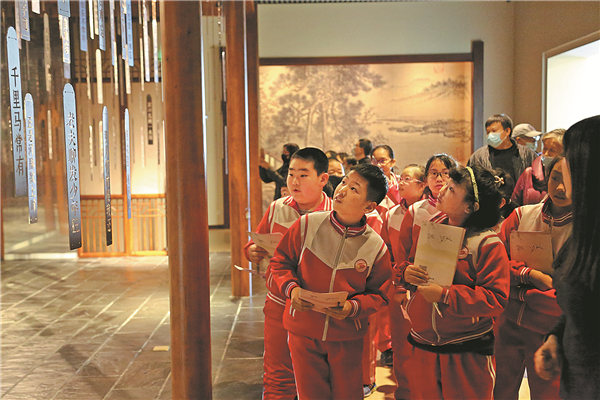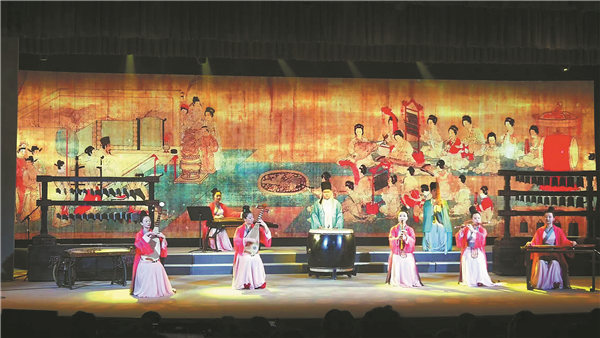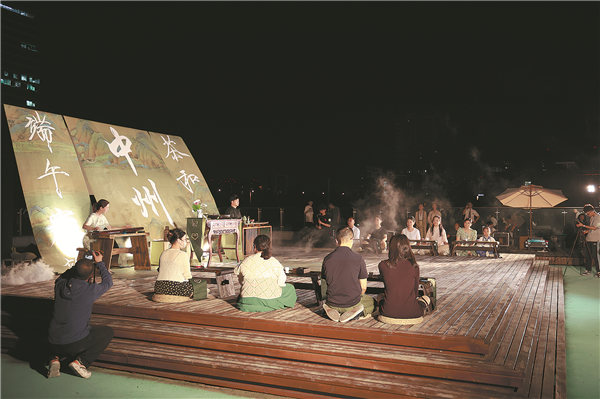Bringing history to life
Visitors wearing hanfu, a traditional Chinese style costume, pose for a photo at Henan Museum in Zhengzhou, Henan province. [Photo provided to China Daily]
From concerts to kids' plays, museums and cultural institutions are conceiving innovative ways to both educate and entertain the public, Deng Zhangyu reports in Zhengzhou.
Museums are this sweltering summer's hot ticket, with visitors struggling to secure entry to the country's cultural institutes, even when booking several days in advance.
When museum directors from across China gathered at Henan Museum in Zhengzhou, Henan province, on July 21 to take part in a cultural seminar, the main topic of discussion was how difficult it is to get tickets to museums. It's reported that tens of thousands of tickets to popular cultural and historical attractions, such as the Forbidden City, also known as the Palace Museum, in Beijing, are sold out in minutes — a phenomenon that reflects the popularity of such institutions.
"I can't help when my friends turn to me for tickets," says Zhai Hongzhi, deputy director of Henan Museum, where a board announcing that tickets are sold out has been set up outside the museum for days.
A popular museum that attracts visitors from across the country, Henan Museum has lifted its daily cap from 10,000 visitors to 12,000 this summer. However, that figure still can't satisfy demand.
Zhang says that, a decade ago, the majority of their museum's visitors were gray-haired, older folk. Nowadays, however, most visitors are young people, especially young parents with their children, and they know clearly what they want to see and learn from museums.
One of the key reasons for the growing popularity of museums among a wider demographic is that they are becoming more interesting, according to a consensus reached by museum directors and experts participating in the cultural seminar, which discussed how to "revive antiques and collections "and make them more attractive to the public.
Children shoot a film for a project at Liaoning Provincial Museum in Shenyang, Liaoning province. [Photo provided to China Daily]
Liu Yang, director of the museum and antique department of the National Cultural Heritage Administration, says that, last year, a further 382 museums were built, taking China's total to 6,565 museums, which between them welcomed 587 million visits in 2022.
"Museums should shoulder responsibility and undertake the mission to help spread traditional culture and build a modern civilization. We have to strive to make museums more interesting," says Liu, adding that the nation has implemented many policies to support museums in recent years.
"The role of museums in China has changed. Decades ago, museums positioned themselves as institutions for collection and protection. Now, they play the role of cultural service providers for the public. There are lots of good examples of museums providing innovative and interesting services," says Liu Shuguang, chairman of China Museum Association.
Henan Museum is such an example, providing diversified cultural services to attract visitors and establishing itself as a rising star in the museum firmament in recent years.
In 2021, a dance program, Night Banquet in Tang Dynasty Palace, performed and filmed at Henan Museum, went viral on the internet. It brought the institution widespread attention. The female dancers were dressed in Tang Dynasty (618-907) costumes and wearing makeup with typical characteristics of that period — inspired by glazed pottery figurines at the museum.
Now, it's common to see visitors, both kids and adults, wearing the same style in the museum. The service is provided by Henan Museum. It regularly offers free classes to teach people about various Chinese traditional costumes and makeup, even offering costume and makeup services for visitors to experience.
Another popular program at the museum is its concert, which sees musicians play ancient pieces of music with traditional instruments that are replicas of antiques collected by the museum — some of which were used more than 2,000 years ago. The clothing styles of the musicians are in line with the dynasties during which their specific instruments were originally played.
"The idea of the concert came about from the antique musical instruments in our museum collection. To display them in an exhibition is not as interesting as playing them and bringing them to life," says Ma Xiaolin, director of Henan Museum. He adds that the orchestra is often invited by big TV stations and cultural institutions to perform for a wider audience.
On the night of Dragon Boat Festival in June, the museum held a night gala that invited visitors to experience the lives of ancient people. It presented a runway show of ancient costumes set to music played by the orchestra. There was also tea drinking in the Song Dynasty (960-1279) style and food tasting of delicacies from that era.
Students from a primary school in Shenyang attend a Chinese class at Liaoning Provincial Museum to learn about ancient Chinese poets. [Photo provided to China Daily]
Ma recalls that they planned to treat 1,000 visitors, but finally had to double the number to satisfy the strong demand.
"Our visitors loved it very much. We plan to hold more activities of that kind during traditional Chinese festivals," says Ma.
Apart from exhibitions and performances, the museum's blind "dig boxes" are star cultural products, widely bought by visitors. Featuring an archaeological theme, the contents of the boxes require "excavation", as if unearthing a cultural relic. In 2021, the sales of its dig boxes reached about 30 million yuan ($4.2 million), with each priced around 200 yuan. It's common to see the museum's shop, with its large display of such boxes, full of people snapping them up.
"To make museums interesting and offering more attractive services to the public will always be our mission and goal," says Ma.
Dong Baohou, deputy director of Liaoning Provincial Museum, says that services now provided by museums should be accessible to as many people as possible.
"If a show can only be understood by those with rich knowledge, it's not a good one. We're now trying to attract more children and teenagers to come to our museum and fall in love with it," says Dong.
Dong says Liaoning Provincial Museum now is one of the most popular educational sites for teenagers because of its diversified and innovative public services.
Many schools hold their Chinese classes at the museum. Poetry recitals are often boring and difficult for children. The museum curates shows that tell the stories of those well-known poets from the Tang and Song dynasties, based on their rich collection of artifacts from that period.
"It's very popular. More than 100 schools cooperate with us. They bring their students to our museum. We offer lectures, teach students to write calligraphy, as those poets once did, and use technology to make the show more vivid," Dong says.
An orchestra performs with replica of musical instruments based on antiques in the collection of Henan Museum. [Photo provided to China Daily]
To enable the young visitors to feel more involved, the museum set up an acting project. It produces various plays about those poets and their works, and invites children to perform in them.
Teenagers have to recite the poems in the play, get to experience the lives of the poets in person and, finally, make a short movie.
"Filming is a very attractive way to draw children. We've received a warm response and support from both parents and their children," says Dong.
The museum also offers shows and exhibitions via a bus that has been refitted to act as a mobile museum to serve children in rural areas. The mobile museum provides the same lectures and experiences to children who can't come to visit due to transportation and cost issues.
Dong says a museum's collection should not be limited to a fixed space, it should go to schools and public spaces to offer more opportunities for people to experience traditional culture.
"It's a good time for museums. People's passion for history is continually increasing. How we provide better services and offer more fun experiences to meet that demand will require effort and innovation," Dong adds.
Henan Museum holds a night gala during the Dragon Boat Festival in June to offer visitors an immersive experience. [Photo provided to China Daily]

